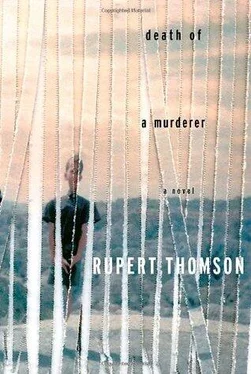The mother’s boyfriend, Gary Fletcher, objected when Billy announced that he would have to search all the rooms in the house, but Billy told him that he was required to do so under Section 17 of the Police and Criminal Evidence Act. It wasn’t that he didn’t believe them; it was the law. When children were reported missing, he said, they often turned out to be at home, or else somewhere in the vicinity, at the house of a neighbour, or a friend. He told them the story he always told, how once, a few years ago, a boy of four had been found hiding inside a sofa in his own front room. If Rebecca had really disappeared, though, a search was crucial, since it might offer some clue as to her intentions or her whereabouts. Had she left a note? Were any of her clothes missing? Had she taken a coat with her? Also — and this he didn’t say, for obvious reasons — a search would give the police a picture of the family: what type of people they were, how they lived.
After he had been through every room, Billy had talked to the couple in the lounge. During the interview Fletcher drank three cans of Special Brew. He used to work at B & Q, he said, but he’d been fired. One of the supervisors had stitched him up. Karen Williams was nodding, but Billy didn’t think she had heard a single word; the gesture was just a reflex, a habit, a way of taking part without attracting attention to herself or having to make a real contribution. He wondered if she was on drugs. She had the brittle, washed-out look of someone who was barely coping. There were two other children, a nine-year-old boy called Dwight, and a girl of two. Neither of them was anything to do with Fletcher. Nor, presumably, was Rebecca. The toddler — Chantelle — had a nappy on, and nothing else. In an unheated house. In November.
Sitting in the mortuary, Billy leant over the misper form and studied the school photo that he had glued into the space provided. Rebecca had a plucky air about her, but he saw a certain apprehension too. Her lips were pale-mauve, and her teeth had a greyish cast to them. Her smile was forced and unconvincing; she’d had very little to put into it. Her hair hadn’t been brushed. She was close to being at the end of her resources.
Some of her classmates had been picking on her, Karen revealed, late on in the interview, as if she had only just remembered. Once, Rebecca had been tied to a tree and left there. Another time, two boys had whipped her. They’d used a car aerial, apparently. Marks/Scars/ Tattoos/Body Piercings… Scars on legs and buttocks. Two — three inches long. Billy asked whether they had lodged a formal complaint with the school authorities. They’d gone down there, Fletcher said, but the head teacher wouldn’t see them. Bastard. Fletcher was one of those people who think of themselves as permanently wronged: he took no responsibility for anything, and nothing was ever his fault. The dynamic between him and Karen was tense but lacklustre. There was almost no eye contact, and Karen deferred to Fletcher constantly in a way that made Billy wonder whether Fletcher hit her. On another day, he might have been taking Fletcher down to the station to be charged. Different paperwork in that case, of course. A Domestic Violence/Incident report.
Billy asked if there was anything that Rebecca particularly liked doing. Shrugging, Fletcher reached for another can, opened it and tossed the ring-pull on the table.
“Karen?” Billy said.
“She’s always on at us to take her to the zoo,” Karen said, “but we can’t afford it, can we.” She sent a wary, hunted look in Fletcher’s direction, which he affected not to notice, then she lit a cigarette.
From the back of the house came the sound of glass shattering. Fletcher jerked upright in his chair. “Dwight?” he shouted. “Come here!” Billy looked at the doorway, but the boy didn’t appear.
Ash from the end of Karen’s cigarette landed on the carpet. Fletcher sank back, scowling, and lifted his can towards his mouth. “Little fucker,” he muttered, and then drank.
Back at the station that evening, the phone rang. It was Karen Williams, calling to tell him that she had spoken to Rebecca.
“So, you know,” Karen said in her sloppy, distant voice, “no need to do anything.”
“Where was she?” Billy asked.
“At her cousin’s — I think…”
Leafing through his report again, Billy checked that he had ticked the High Risk box. A few moments later, he took the piece of jet from around his neck and placed it on the photo of Rebecca, just below the V-neck of her school jersey. It will protect you. After work on Sunday he had driven straight home, needing company, distraction, but he had forgotten that Sue was going to the cinema with friends, and that he had agreed to babysit. When he walked in through the front door, she was facing him across the hall, one arm already in her coat, the other bent behind her and searching blindly for the opening.
“Don’t forget that Emma needs a bath,” she said, “and I haven’t given her any supper yet.”
That night, when he had sung Emma to sleep, he poured himself a large vodka and sat down at the table in the kitchen. He kept returning to the section on the form that said Other unlisted factors the officer believes should influence the level at which this assessment is weighted. Rebecca had been missing for most of Saturday, but Karen hadn’t bothered to call the police until late on Sunday morning. She said she thought Rebecca was in her room. She hadn’t checked, though. If a girl Rebecca’s age went missing, and she had wild friends or a history of truancy, the police would start worrying only when she had been gone for two days, but with a quiet girl like Rebecca, you’d start worrying much sooner. In the end, he wasn’t sure he believed what Fletcher and Karen had told him. Who was to say that the abuse they’d described hadn’t taken place at home? Fletcher unemployed, frustrated, drinking; Karen on drugs, or in denial…They could easily have made up that story about the two boys and the aerial. It would be interesting to find out if there was any record of their visit to the school.
The following day, the Monday, when the phone-call turned out to be for him, Billy thought it might be the community officer — he had left a message for her outlining his concerns — but it was Phil Shaw, about another job entirely…
Though Billy had put the report away, the look Rebecca had in the photograph still haunted him. I’ve tried, her face seemed to be saying, I really have, but it’s no use. He let his mind wander in the hope that it might offer him a strategy, a course of action that would guarantee her safety. It depressed him to think that he might already have done everything he could, just as it had depressed him on Sunday night. When Sue got back from the cinema, she found him sitting in the kitchen with his head in his hands, the vodka bottle nearly empty.
“I was planning to look in earlier,” Phil said when Billy opened the door, “but things kept coming up.”
Stepping into the mortuary, he seemed to scour the air with his nose, as if he relied on his sense of smell for a reading of the situation. There was a distinctly feral aspect to the sergeant, now Billy thought about it. There always had been.
Phil put both hands flat on the table, on either side of the scene log, and studied the recent entries. “I heard Sue was here.”
Billy swore under his breath. He’d been hoping to keep that from Phil. “She stopped in about an hour ago,” he said. “There was a problem with Emma.”
“It’s sorted now, though?”
“Yes.”
Still bent over the scene log, Phil looked at Billy across one shoulder, and Billy saw a question form: Is everything all right at home? He also knew this was a question that Phil probably wouldn’t ask. The last time he’d had Phil over to the house, they had got drunk in the garden, and when Sue went to bed, Phil had started talking about his life — his wife had walked out, no children luckily — and there had been no bitterness in him, just a wistful quality, a kind of disbelief: that it should happen to him…On that occasion Billy hadn’t pried, or pressed for details; he had simply waited until Phil had finished, then murmured, Fuck and poured Phil another drink. There was nothing else to say. If you were in the police, you rarely asked about each other’s marriages because you knew what the answer was going to be. All right? It was almost never all right. Police officers worked anti-social hours. They drank too much and slept too little. They ate junk. They were society’s dustmen, always cleaning up, dealing with the rubbish that no one else wanted to deal with. Most of them had gone into the job with good intentions, thinking they could be of use, but they soon realised that the task was well nigh impossible. If you closed one crack house down, a new one sprang up somewhere else. Book one prostitute, and three more would be doing business round the corner. As for burglary, forget it. Recently, a constable in his fifties had told Billy that he was now arresting the sons and grandsons of people he had arrested when he first started out. The crime figures might go up or down, but nothing changed, not really. The pressure on police officers was immense, and their home lives suffered. Phil knew that better than anyone.
Читать дальше












